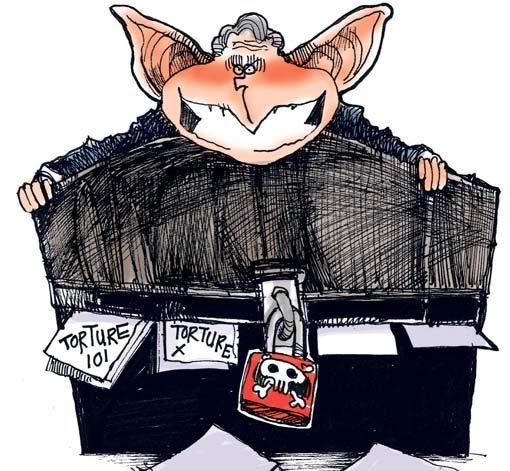In its so-called war on terror, the Bush administration has shown an astonishing disregard for the rule of law in its consistent violation of American and international laws banning torture.
The Bush administration's approach, unprecedented in American history, relied on secrecy and deception - shameful attributes that, along with torture, Bush has harshly criticised in other countries which he described as authoritarian and evil.
Bush had famously dismissed, in May 2005, Amnesty International's accusation of war crimes and torture of detainees in US custody as "absurd".
Recent front-page revelations made by the New York Times show that the Bush administration has in fact relied on two secret memos justifying its torture policy.
The revelations show that the White House ignored critics of its policy and encouraged appointments of cooperative counsels at the Justice Department who could be relied on to stretch the law to give the president authority to ignore the Geneva Convention's ban on torture.
There was opposition from both the State Department and the Justice Department. The State Department lawyer, William Taft IV, expressed alarm at the criminality of the practice of torture and the Bush administration's attempt to justify it.
In a lengthy legal opinion, which he sent to the Justice Department on January 11, 2002, and to the White House, he reportedly warned that disregarding the Geneva Conventions was "untenable". He urged them to warn Bush that he would "be seen as a war criminal by the rest of the world".
Nevertheless, the Bush administration continued to defend its torture policy. It denied permission to UN human rights investigators to meet with detainees at Guantanamo whose accounts the Bush administration did not want the world to hear.
Such accounts would, wrote the Washington Post, "surely add to the discredit the United States has earned for its lawless treatment of foreign prisoners".
Despite growing opposition and criticisms, the Bush administration went on to rely on an infamous "torture memo" prepared in August 2002 by John Yoo, a junior lawyer in the Office of Legal Council in the Justice Department, who sought to give the Bush administration justification for torture by arguing that the president could disregard the Geneva Convention's ban on torture.
Other Justice Department lawyers, including Jack Goldsmith and Daniel Levin, were disturbed by Yoo's flawed justification of torture and in June 2004, Jack Goldsmith, the new Head of the Office of Legal Counsel, formally withdrew the "torture memo" - infuriating the Bush White House.
In December 2004, the Justice Department published a new legal opinion, prepared by Levin, which said that: "Torture is abhorrent both to American law and values and to international norms."
To ensure a more compliant Justice Department and more accommodating legal justifications of torture, Bush appointed, in February 2005, his White House Counsel and close friend Alberto Gonzales as the Head of the Justice Department.
Gonzales removed Levin out of the way, and appointed a more cooperative Steven Bradburg as the Head of the Office of Legal Counsel. A secret memo justifying torture was prepared, much to the satisfaction of the White House.
While blocking any serious investigation of torture and murder, the Bush White House and especially Vice-President Dick Cheney, sought to circumvent the Congressional ban on torture. Cheney lobbied Congress to exempt the CIA from the amendment - in effect asking lawmakers to legalise torture by the CIA.
When this extraordinary request failed, Gonzales's Justice Department came to the rescue by issuing a second secret memo reassuring the White House that its torture policy used by the CIA in prisons around the world did not violate the Congressional ban on "cruel, inhuman and degrading" treatment.
Deception
The Bush administration's campaign of deception kept the memos secret not only from the American people and the international community, but also from the American Congress.
"I find it unfathomable," Senator John D. Rockefeller IV recently wrote to the Justice Department, "that the committee tasked with oversight of the CIA's detention and interrogation programme would be provided more information by the New York Times than by the Department of Justice".
In effect, the Bush administration was secretly reinterpreting the law, hidden from the scrutiny of law makers, sheltered from accountability to the people, and in disregard of the basic democratic principle of the supremacy of the rule of law.
The editors of the New York Times expressed alarm at the kind of America the Bush administration was creating.
They rhetorically asked whether this was a country that condemned torture and promoted human rights around the world, or "a nation that tortures human beings and then concocts legal sophistries to confuse the world and avoid accountability before American voters."
Professor Adel Safty is author of 'From Camp David to the Gulf'. His latest book is 'Leadership and Democracy'.













